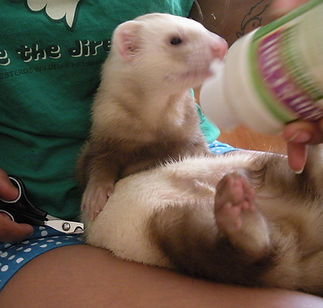

Fairoak Ferrets
{Angora and Standard Ferrets}
{MAINTAINING A HEALTHY FERRET}
Ferrets need routine things done to keep them happy and healthy. Ferret claws can grown quite long and sharp so often need a little trim. Our ferrets get their nails trimmed one every 7 to 14 days. If their nails are left to grow, they can curl underneath the foot making it very difficult for them to walk correctly.
Nail trimming is quick and easy once you get the hang of it, and we are happy to demonstrate to you if you wish. To start we place one of the ferrets on our lap and turn them over so the tummy is showing. We then splash a little ferret oil (See "Feeding Ferrets" above) onto the tummy and direct the ferrets head to the treat. Your ferret will them be so occupied trying to lick all the oil off that he/she wont notice you trimming the claws! We use a small animal nail scissors, as human nail clippers can splinter the ferret nail. Take off the tip of the nail, enough to blunt it but not so much that you cut close to the quick (the red vein that can be seen through the nail) as this will hurt your ferret and cause them to bleed. If you do accidentally trim the quick then a little cornflower dabbed on the inflicted claw will clot the blood and stop the bleeding.


An example of clean pink ears.

Ferret ears are also another thing to be checked. We clean our ferrets ears once a fortnight as over cleaning is as bad as not cleaning at all! Ferrets can get quite grubby ears full of wax, they generally lick each others clean but sometimes need a little human intervention.
Ear cleaning treatments can be purchased in pet shops but we tend to use the ferret oil once again. A little dab of oil in the ear will loosen up the waxy deposits, then with a baby wipes gently wipe the residue from the folds of the ear. Don't poke into the ear canal as this isn't very pleasant for your ferret and can also push wax further into the ear and cause a blockage. You just want to wipe away the visible wax to keep them clean and pink. Your other ferrets will finish the job for you by trying to lick any left over ferret oil in their cage-mates ears, leaving a nice clean finish.
Ear wax should be brownish and odourless, if you see black wax or hard clumps or the ears smell unpleasant then your ferret may have ear mites. Ear mite treatments can be purchased from your vet and all of your ferrets will need to be treated as one with mites will pass it onto the others. Mites are not uncommon but are best to be treated quickly to prevent damage to the ear, this is why giving the ears a routine clean is advisable.
Black earmite residue
Ferret teeth are amazingly long for such a little jaw. They resemble cat teeth with their long canine "fangs". Such long teeth are needed for ripping and cutting meat, so need to be checked that they are in good working order. We look in our ferrets mouths every day for any breakages or plaque and tartar build up. Yellow build up is plaque, if plaque is left it will turn to hard green/grey tartar that is difficult to remove. Tartar build up can lead to gum disease, so it is important you prevent tartar build up.
Feeding your ferret raw meat and bones acts as a natural toothbrush and cleans away grime as they chew and crush up the abrasive bones. Raw chicken wings are great toothbrushes so we feed them twice a week to our ferrets to keep those teeth looking tip top. Cat and dog enzymatic toothpastes can be bought and help keep teeth white and clean. Not many ferrets like having their teeth brushes, so a blob of cat/dog toothpaste (usually chicken flavour) in the mouth works well. The sticky paste sticks to the teeth while the enzymatic action breaks down plaque. We like to give a blob of Virbac Enzymatic Chicken Toothpaste to our ferrets once a week to keep teeth nice and white.
Ferret fur does not need brushing, even with angora coats. They keep their fur clean with constant grooming like cats do and they stay tangle free. Ferrets do not need bathing either, if you shampoo your ferret too often, they will smell muskier more due to the fact that they will over produce oils in their skin to compensate for the ones washed away. For more on ferret smells, see "Neutering your ferret" above. We always check our ferrets fur for any infestations, especially if they have been walking in long grass as fleas and ticks like to jump onto fur. Ferrets can pick up fleas from other infested animals, so keep check for any problems and purchase flea and mite treatments in a suitable dose for ferrets from your vets.

An example of clean, white, perfect teeth.

An example of teeth with plaque and the start of tartar build up.

Chewing on chicken wings act as a natural toothbrush to keep tartar at bay.